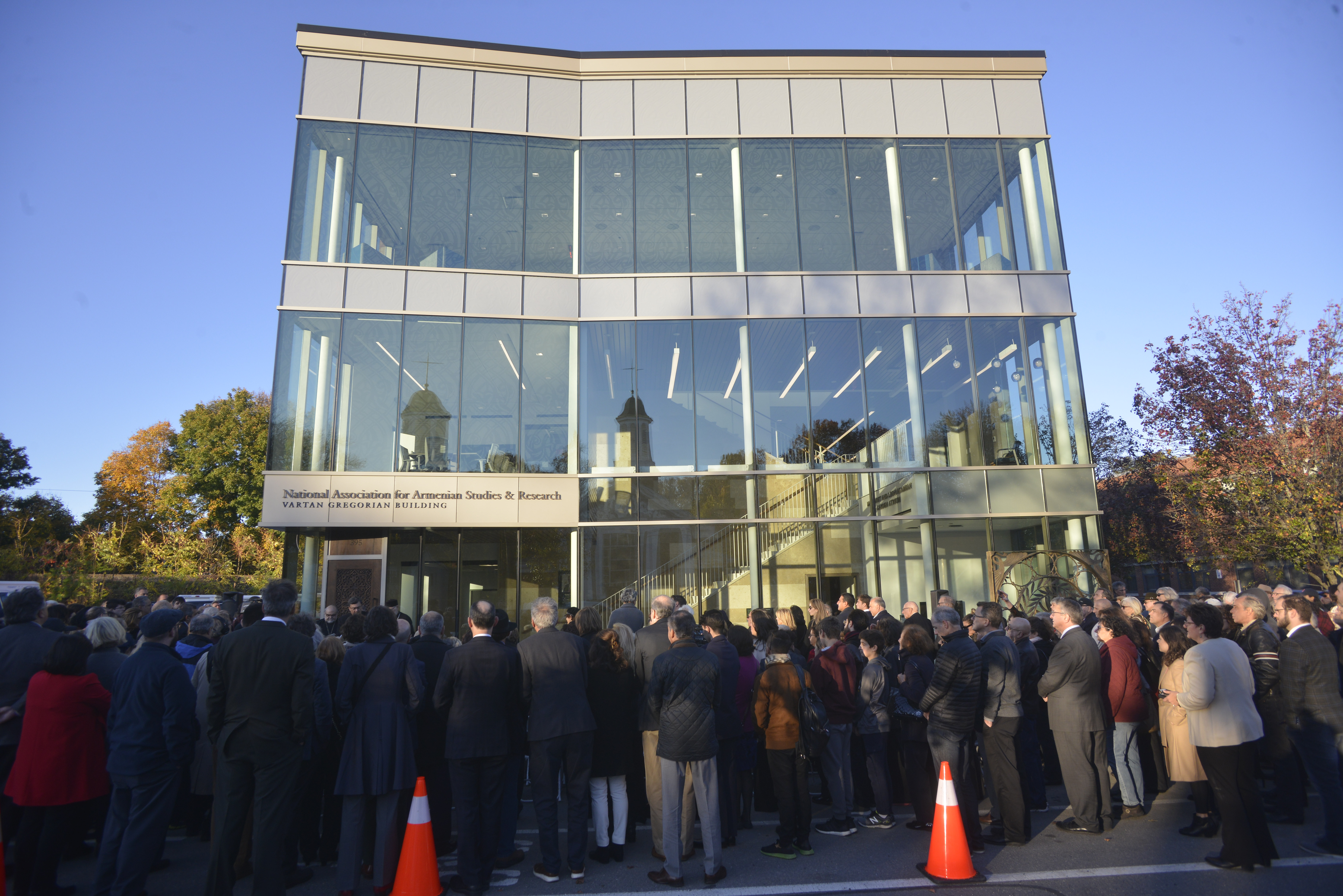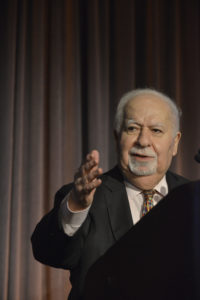Whenever I am excited about our accomplishments in the western diaspora, I think about the irony of our success given how the diaspora was created. The infrastructure of our American diaspora began prior to the genocide but became a permanent reality as a result of that evil event. Armenians had migrated before 1915 primarily as a result of earlier oppression or for economic opportunities. My paternal grandfather came to these shores in 1913 as a young unmarried man sent here by his father to earn money and avoid the instability of pre-world war western Armenia. It was always his intent, like thousands of others, to return to the homeland. He never saw his parents again. Eventually, he joined the Armenian Legion, fought in the Levant and helped liberate our Cilicia. He found his siblings, met my future grandmother and returned to this country when we were abandoned by the French in 1920. These stories, repeated thousands of times, became the full establishment of the American diaspora. For the ultra-nationalist racist Turks, it was their belief that those who escaped would be unable to re-establish their sense of community or pass our faith and heritage to succeeding generations. Scattered to the wind, the remnants of a murdered nation would dissipate into humanity. The timeline of our history ending was their horrific objective.
Well, we know how that worked out. They failed miserably. Our “greatest generation,” without wealth and education, gifted us a miracle. We not only survived, but began to thrive four generations later. Communities have been functioning for decades with a focus on education, culture, faith and philanthropy. Problems? Yes. Challenges? Of course. But we have carried the cause of justice, and since 1989, have turned our collective attention to Armenia and Artsakh while sustaining the infrastructure and challenges of our diaspora. We all appreciate our heritage in the privacy of our families, but it is only through participation in the greater communities of the diaspora that we gain a full appreciation for our journey.
I am particularly moved by the commitment and generosity of our nation. From the tireless workers laboring to hold church bazaars and cultural festivals to the nationally visible philanthropy of building both here and in Armenia, the volume and impact are impressive. Armenians in the diaspora have used their good fortune to become educated, professionally accomplished and wealthy. These are the same attributes that our ancestors possessed in the western homeland. They were denied the privileges of human dignity as a result of the barbarity of the genocide, but their values remained intact and were ingrained in succeeding generations. It is remarkable that our philanthropy to the diaspora has been maintained while the incremental investing in Armenia and Artsakh has been initiated. The good news is that there are any number of causes and organizations through which all Armenians can participate by investing in the diaspora and Armenia. The challenging news is that it can be overwhelming, and concerns grow over saturation. We all worry about how our parish, our foundation, our projects or our organizations can be supported. All Armenians should take pride in the significant expansion of our investment, while the breadth has increased. While millions are rightfully invested into the educational, medical and economic infrastructure of Armenia, we are building churches, educational centers and museums in the diaspora. Think about that. We tend to focus on the problems we have for obvious reasons. They can erode confidence and dilute our impact. No one wants to see our churches accomplish wonderful work when we have a cloud of corruption hovering over our leadership. It is important, however, to put these challenges in context.
Problems and challenges are never the reason to avoid investing. They are the reason to invest.
The good things are more impactful than the challenges. I remember a number of conversations with friends in the pre-Pashinyan era. Several were concerned that the corruption was a reason not to invest in Armenia. My response was that while the corruption issue would eventually become manageable, there were countless “under the radar” projects that would be transparent and serve as worthy investments in Armenia. That analogy can be applied to our diaspora in general. Problems and challenges are never the reason to avoid investing. They are the reason to invest.

It is quite heartening to see our philanthropic capability expand as the opportunities have grown. It appears that saturation has not been an issue. Hard work? Yes, but the fruit is on the vine. Let me offer a current reality that exemplifies this point. This has been a particularly busy autumn for public events and fundraising in New England. Despite increased communication and cooperation, there are only so many “windows” to hold major events. The Armenian Heritage Park held a gala celebrating the immigrant experience and honoring Noubar Afeyan in mid-September. The target of the fundraising was to complete the perpetual fund for the maintenance of this treasure on the Greenway. The AMAA held its 100th anniversary gathering in Boston a few weeks ago, celebrating the philanthropy and faith of the Armenian Evangelical and Protestant community. Just this past weekend, NAASR opened its new center in Belmont with a spectacular two-day celebration. The new seven million dollar Vartan Gregorian Center will open a new era of Armenian studies, education and research. St. Stephen’s Armenian Day School will celebrate its 35th anniversary with a major event in the middle of November. The ANCA Eastern Region will hold its annual gala in New England this weekend featuring awards and celebrating successes. This is particularly timely given the recent House Resolution. Children of Armenia Fund (COAF) will hold its annual gala and fundraiser in NYC later in the year. These are not advertisements. They all have a common thread. All of these important gatherings either have been or will be sold-out events raising significant sums of money for Armenia, for education, for our political and human rights and for the sustainability of our faith. Each of these examples are in and of themselves a reason to celebrate.
Another reason to feel pride is to view them in aggregate. This is a major accomplishment given the density of worthy activity. They represent in total the fullness of our Armenian experience, education, culture, political rights and faith. There were many who supported multiple events. God bless them. We can’t all go to everything, but supporting can also mean placing a value on its importance. I am a lifelong adherent to the Apostolic faith, but I respect and appreciate the contributions of the Armenian Protestant and Catholic community. They are fellow Christians and an important part of our greater family. Our present and future lie in pan-Armenian thinking. That does not mean that we are all the same or that we do not share different perspectives. Our diversity should enhance us, not divide us.

This past weekend I had the honor to hear Vartan Gregorian speak at the NAASR Gala and also share his thoughts in smaller groups. With the emergence of Armenia and Artsakh, it has served as a unifier for the diaspora. Our differences become subordinated to the needs of our homeland, and thus our true capabilities emerge.
Vartan went on to say that if our enemies did not differentiate us, how can we divide ourselves? Such wisdom. This applies beyond the genocide to today. So you think the Azerbaijani aggressors are finding Armenian Protestants when randomly attacking Tavush? Do they only look for Dashnags in Artsakh? Does the invisible arm of assimilation and loss of identity only apply to Apostolics? I think you get the point. We need to walk the talk. I do see enlightenment in our midst. The diaspora now has a new mission to revitalize its sense of purpose. We must invest in Armenia and Artsakh, and the diaspora must remain strong to be capable of investing. There you have it! A closed looped identity process. Stay strong so we can help others.
We are fortunate as Armenians to live in an exciting time with a vibrancy in our community. All of us have moments of despair or disappointment in our Armenian identity. That is the time to take a more “macro” view to gain a fresher perspective. It is only then that you realize the incredible progress made in several areas of our communal life. The emergence of the Aurora Prize, for example, represents unprecedented enlightenment in our nation in several dimensions. The diaspora and Armenia are featured together in this initiative. The concept of Armenians recognizing and gifting others elevates our people as world citizens. It puts the genocide in a new context and brings support to Armenia with a new and complimentary approach. During this November season of Thanksgiving, I am thankful for the dynamic reinvention taking place in our community. New ideas, fresh thinking and generational transitions are happening. Our people are responding with their hearts influencing their minds and frankly their wallets. We will not be known as a victim community that simply became successful individually. We will be recognized as a survivor people who took advantage of their misfortune and have applied those opportunities to thrive for the benefit of others.



Be the first to comment